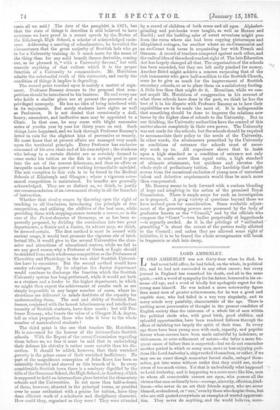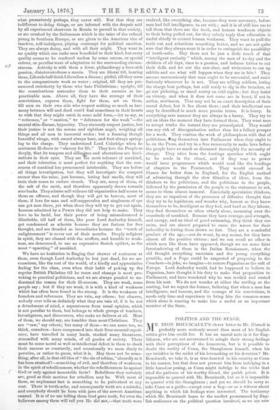LORD AMBERLEY.
LORD AMBERLEY was not thirty-four when he died, he had never held office, he had failed, on the whole, in political life, and be had not succeeded in any other career; but every journal in England has remarked his death, and all in the same spirit,—with a word of sympathy for his father, bereaved in his ex- treme old age, and a word of kindly but apologetic regret for the young man himself. He was indeed a more noteworthy figure than many men of greater achievements, for he was a good and capable man, who had failed in a way very singularly. and to many minds very painfully, characteristic of the age. There is nothing more provocative of thought in the present condition of English society than the existence of a whole list of men within the political circle who, with good birth, good abilities, and splendid opportunities, have been rendered failures through the effect of imbibing too largely the spirit of their time. In every age there have been young men with rank, capacity, and popular favour whose careers have been made unfruitful by indolence, or viciousness, or over-refinement of nature—the latter a more fre- quent cause of failure than is suspected—but we do not remember another period in which so many men, more or less enjoying posi- tions like Lord Amberley's, shipwrecked themselves, or rather, if we may use an exact though somewhat forced simile, embayed them- selves, got into water without outlet that they could use, under stress of too much virtue. Yet that is undoubtedly what happened to Lord Amberley, and is happening to a score more like him, men to whom all conceivable careers are open, who possess all the virtues that men ordinarily love—courage, sincerity, affection, kind- liuess—who never do an act their friends regret, who are never blamed, or slandered, or" cut," even by those who despise them, but who are still quoted everywhere as examples of wasted opportuni- ties. They never do anything, and the world believes, some-
what prematurely perhaps, they never will. Not that they are indifferent to doing things, or are infected with the despair said by all experienced observers in Russia to prevail in that society, or are crushed by the listlessness which is the taint of the refined young in Southern Europe, or are given to the American vice of inactive, self-indulgent, pitying contempt for political exertion. They are always doing, and with all their might. They want in no quality which can make men beneficial to their kind, but every quality seems to be rendered useless by some excess, or special colour, or peculiar want of adaptation to the surrounding circum- stances. Activity is with them a fever, philanthropy a love-sick passion, disinterestedness a mania. They are liberal till, hearing them, Liberals half think Liberalism a disease; pitiful, till they seem to the compassionate weak as water ; original, till they are pro- nounced crotchetty by those who hate Philistinism ; upright, till the conscientious surrender them to their enemies as im- practicable men. Above all, they have the courage of their convictions, express them, fight for them, act on them, till men on their own side who respect nothing so much as har- mony between will and deed could find sometimes in their hearts to wish that they might catch in some mild form,—let us say, as "reticence," or "caution," nr "deference for the weak "—the mental skin-disease, hypocrisy. They sincerely respect justice, but their justice is not the serene and sightless angel, weighing .all things and all men in immortal scales ; but a foaming though beautiful virago, with sword always bare, and foot always spring- ing to the charge. They understand Lord Coleridge when he sentences ill-doers to "slavery for life." They love the People so deeply, that its tempers and sillin&es and aberrations are fasci- nations in their eyes. They are Me most tolerant of mankind, and their toleration is most perfect for anything that the con- sensus of mankind has pronounced intolerable. They are before all things investigators, but they will investigate the cesspool sooner than the mine, just because, hating bad smells, they will train their noses to endure stench. They are, many of them, of the salt of the earth, and therefore apparently drawn towards sorebaeks. They admire self-reliance till organisation half seems to them an offence, and though they will get to heaven, most of them, if love for man and self-suppression and singleness of eye can get men there, yet when there they will try to get out again, because admitted by a Power they did not help to make, They love to be lucid, but their power of being misunderstood is illimitable, till half of them, like poor Lord Amberley himself, get condemned as atheists because they are furious for free thought, and are dreaded as incendiaries because the "torch of enlightenment " is never out of their months. Deeply religious in spirit, they are classed with the scoffers, and humble to weak- ness, are denounced, to use an expressive Scotch epithet, as the most "upsetting" of mankind.
We have no hesitation in flinging that shower of sentences at them, even though Lord Amberley be but just dead, for we are conscious, like the rest of the world, of a kindly and appreciative feeling for the class, even when their habit of poking up the regular British Philistine till he roars and champs is most pro- voking to practical politicians, and we are always puzzled to un- derstand the reason for their ill-success. They are weak, some people say ; but if they are weak, it is with a kind of weakness which has often been found in the strong. It is the weakness of founders and reformers. They are vain, say others ; but observe, nobody ever tells us definitely what they are vain of, if it be not a detachment of mind, a separateness from usual opinion, which is not peculiar to them, but belongs to whole groups of teachers, investigators, and discoverers, who make no failures at all. Most of them, we should say, are humbler than most Christians. They are "raw," say others ; but many of them—we can name ten, we think, ourselves—have compressed into their lives unusual experi- ence, have travelled in many lands, studied many literatures, counselled with many minds, of all grades of society. There must be some moral as well as intellectual defect in them to check their success so constantly, and occasionally we seem dimly to perceive, or rather to guess, what it is. May there not be some- thing, after all, in that old idea of "the sin of schism," absurdly as it has been strained?—something of evil, and therefore of weakness, in the spirit of rebelliousness, whether the rebelliousness be against God or only against immutable facts? Rebellious they certainly are, good as their motives for rebellion may be. With most of them, an unpleasant fact is something to be pulverised at any cost. There is tooth-ache, and consequently teeth are a mistake, and everybody should be born with jaws of the newest American enameL It is of no use telling them God gave teeth, for even the believers among them will tell you He did not,—that teeth were
evolved, like everything else, because they were necessary, before man had full intelligence, to eat with ; and it is of still less use to tell them that there are the teeth, and human weakness objects to their being pulled out, for they calmly reply that education is- useful chiefly to correct human weakness. They want to pull the teeth out and substitute something better, and we are not quite sure that‘they always want it in order to extinguish the possibility of tooth-ache. May there not be just a little touch of that "intelligent curiosity" which, among the men of to-day and the children of all days, rises to a passion, and induces babies to cut their dolls and let out the saw-dust, and vivisectors to cut up rabbits and see what will happen when they are in bits ? They assume unconsciously that man ought to be successful, and resist furiously whenever he is not. They are willing soldiers, loving the charge best perhaps, but still ready to dig in the trenches, or go out.picketing, or stand sentry on cold nights ; but they insist on victory, and when it does not come are in heart, if not in action, mutineers. That may not be an exact description of their moral defect, but it lies about there ; and their intellectual one may be described in much more precise terms. It is hurry. In everything save manner they are always in a hurry. They try to act on ideas the moment they have formed them. They want men. to accept truths the instant they are promulgated. They would run any risk of disorganisation rather than let a fallacy prosper for a week. They confuse the work of philosophers with that of politicians, Ring themselves into Parliament when they ought to be on the Press, and try in a free community to make laws before the people have so much as discussed thoroughly the necessity of change. They utter from the hustings speeches which ought to be made in the closet, and if they rose to power would issue programmes which would read like the headings of chapters in the Pentateuch. They would succeed in France far better than in England, for the Enlisll method of advancing through the slow filtration of ideas, from the thinkers to the politicians, and the politicians to the people,. followed by the permission of the people to the statesmen to act, seems to them almost immoral. Essentially speculative thinkers, they are so impatient of the processes of diffusive thought that they try to be legislators, and wonder why, honest as they know themselves to be, intelligent as they feel, and hard as they labour, they find themselves so often utterly alone, mourning over the crassitade of mankind. Because they have courage, and strength, and energy, and an ideal of good swimming, they think they can swim, and are almost prepared to curse the waves for their imbecility in letting them drown so fast. They are a wonderful product of the age,—not its worst, by any means, for they have almost all the positive virtues ; and we can recall no other in which men like them have appeared, though we see some faint foreshadowing of them in the Italian Renaissance, when the old thought everything uncertain and the young everything possible, and a Pope could be suspected of proposing to the Conclave—in joke, we imagine—to restore Paganism as the cult of Europe. Lord Amberley would, had he happened to believe it Paganism, have thought it his duty to make that proposition to Parliament, and have wondered why he was reviled and ousted' from his seat. We do not wonder at either the reviling or the ousting, but we regret the former, believing that when a man has intelligence, and honour, and the courage of his convictions, it needs only time and experience to bring him the common-sense which alone is wanting to make him a useful or an important member of the State.



































 Previous page
Previous page